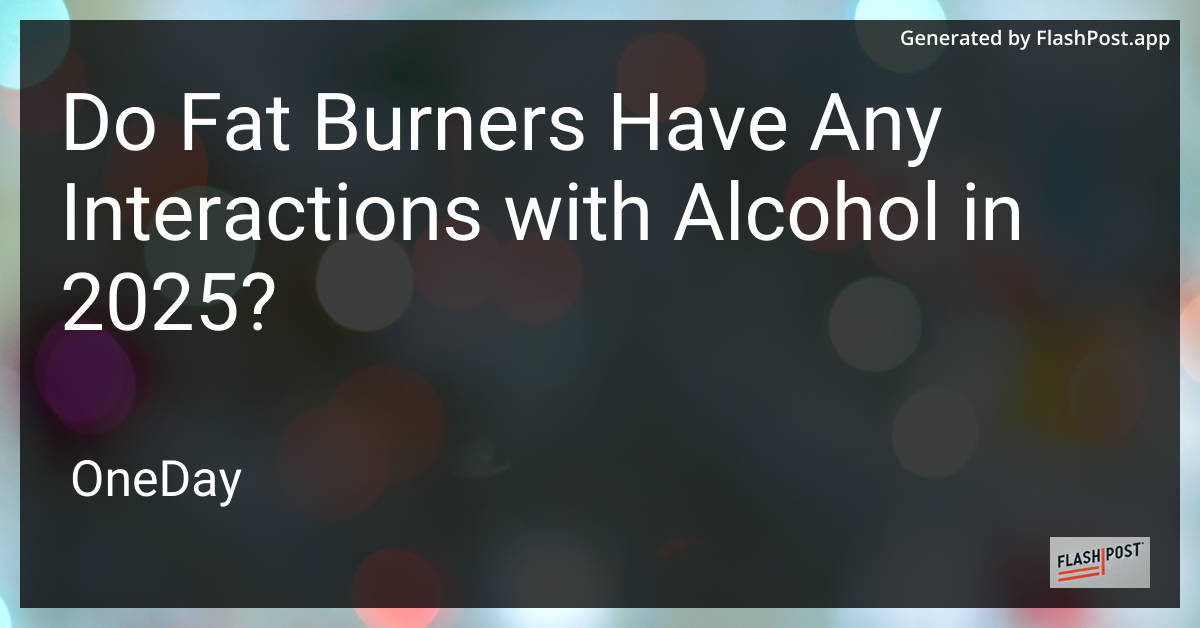
As the wellness industry continues to boom, fat burners remain a popular choice for individuals looking to accelerate weight loss and achieve their health goals. While these supplements can provide a helpful boost, combining them with alcohol could lead to unintended consequences. In this article, we explore whether fat burners have any interactions with alcohol in 2025, and what you need to know to ensure safe and effective use.
Understanding Fat Burners
Fat burners are dietary supplements designed to increase metabolism, enhance energy levels, and promote fat loss. They often contain ingredients like caffeine, green tea extract, and L-carnitine, which can stimulate the body's central nervous system and boost fat oxidation.
Alcohol and Its Effects on the Body
Alcohol, on the other hand, is a depressant that affects the central nervous system, alters metabolism, and can impair judgment. Consuming alcohol in large amounts may counteract some of the positive effects of fat burners and present other health risks.
Potential Interactions Between Fat Burners and Alcohol
Metabolic Concerns
Both fat burners and alcohol can significantly impact your metabolism. When combined, they may compete for metabolic processes in the liver, potentially reducing the efficacy of the fat burner while increasing the strain on the liver.
Increased Heart Rate
Many fat burners contain stimulants like caffeine that elevate heart rate. Alcohol can also increase heart rate and blood pressure, and the combination could exacerbate these effects, posing risks for those with pre-existing cardiovascular issues.
Dehydration Risk
Both alcohol and fat burners can lead to dehydration. Drinking alcohol while taking fat burners might increase your risk of dehydration, causing headaches, dizziness, or more severe complications.
Altered Efficacy
The consumption of alcohol can hinder your weight loss efforts by adding extra calories and impairing physical performance. This can make the effects of your fat burner less noticeable or beneficial over time.
Safe Usage Tips
-
Moderate Alcohol Consumption: If you choose to consume alcohol, do so in moderation to minimize potential interactions.
-
Stay Hydrated: Increase your water intake to combat dehydration from both supplements and alcohol.
-
Monitor Heart Rate: Be aware of your body's response, especially if you have a history of cardiovascular issues.
-
Consult with a Healthcare Professional: Before combining any supplements with alcohol, talk to a healthcare provider to ensure safety.
Conclusion
While fat burners and alcohol might both have their place in lifestyle choices, using them together can lead to potential interactions or decreased effectiveness. Understanding these dynamics can help you make informed decisions for safe and effective use in 2025.
For more insights on achieving effective fat loss, check out this article on effective fat loss supplements. If you're interested in optimizing your treadmill workout, consider this analysis of incline vs speed for fat loss 2025. Additionally, explore how to lose belly fat running in 2025.
With the right knowledge and approach, you can navigate the complex landscape of supplements and lifestyle choices to reach your health goals effectively.